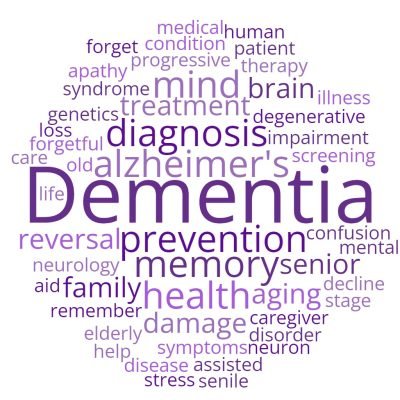Dementia is a general term that does not refer to a specific disease, but rather a set of symptoms affecting brain function that are caused by neurodegenerative and vascular diseases or injuries. One of the most common forms of the disorder is Alzheimer’s disease, but there are others as well. This set of diseases is not a natural part of aging and usually affects people over 65 years of age, but early-onset dementia can also affect people under 65.
For more detailed information on dementia, scroll down on this page and visit our Resource Center.

This stage is often overlooked as there is a gradual progression process, but it is critical to identify dementia in this stage to be able to manage the symptoms. Common symptoms include:
- Forgetfulness
- Confusion with time and places
- Communication problems
At this stage, the signs and symptoms become clearer as an individual’s dementia progresses. These signs and symptoms include:
- Increasing problem with communication
- Need for assistance to perform everyday activities
- Feeling lost at home
- Rapidly forgetting recent events and people
- Change in behavior
An individual in the late stage can no longer be independent and the signs and symptoms are very noticeable. These include:
- Total dependence on others
- Extreme temper and behavior changes
- A drastic drop in mobility
- Not recognizing family members and close friends
- Unaware of most things happening in their surroundings
The greatest risk factor for Alzheimer’s Disease and other forms of dementia is aging. Researchers have identified 14 risk factors, which if modified, could potentially reduce or delay the number of new diagnoses of dementia by 45%.

Physical Inactivity
Smoking
Excessive Alcohol Consumption
Air Pollution
Head Injury
Infrequent Social Contact
Less Education
Obesity
Hypertension
Diabetes
Depression
Hearing Impairment
According to Alzheimer’s Disease International there are currently estimated to be over 55 million people worldwide living with dementia. The number of people affected is set to rise to 139 million by 2050. In January 2025, the Alzheimer Society of Canada estimated that there were 771,939 Canadians living with dementia and that by 2030 this number may rise to nearly 1 million and to 1.7 million by 2050.
The most common form of dementia is Alzheimer’s Disease, which accounts for 60-70% of all cases. Other widely known forms include Lewy-body, Parkinson’s disease, Frontotemporal, and Huntington’s disease. Boundaries are often hard to identify, so there exist mixed forms of dementia.
As of 2021 there is no cure for dementia. There are medications that temporarily reduce the progression of symptoms. Nevertheless, we need to push through with research and clinical trials to make a change.
The socio-economic impact of dementia can simply not be disregarded as it is significant and ever-growing. This includes the impact on our healthcare system and out-of-pocket caregivers’ cost. It was reported in the study Prevalence and Monetary Costs of Dementia in Canada, the combined Canadian health care system costs and out-of-pocket caregiver costs amounted to $10.4 billion in 2016. By 2031, this figure is expected to increase to $16.6 billion. People are stepping in as caregivers due to their parents or grandparents having the disorder. This leads to a loss of productivity in the economy and millions of unpaid hours as caregivers. These figures will only keep increasing as time goes by.

Hope for Dementia aspires to be a leading advocate and catalyst for the prevention and reversal of dementia.
Our mission is to safeguard healthy brains. To do this, we focus on building public awareness, offering proactive prevention programs and investing in promising research on the deceleration and reversal of symptoms that provide “Hope for Dementia”.